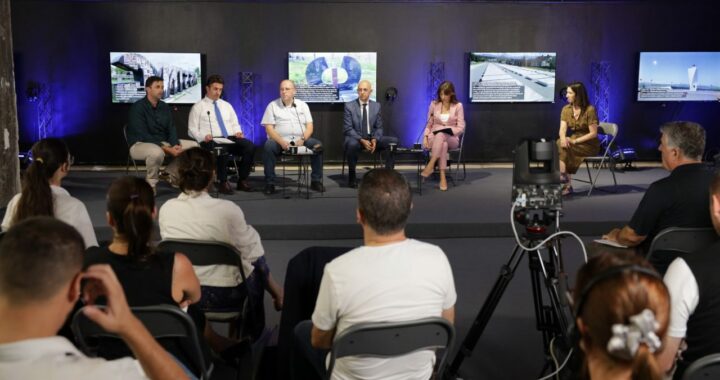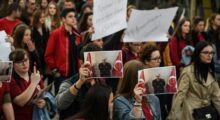Public institutions in Kosovo, including government institutions, independent agencies and justice institutions, do not have platforms properly informing the public about war crimes and transitional justice, a BIRN report launched in Kosovo on Wednesday concluded.
Kreshnik Gashi, managing editor of BIRN and Internews Kosova publication in Albanian, Kallxo.com, and co-author of the report ‘The Other’, Who Does not Exist, said: “There is no information about judicial processes in the Kosovo justice institutions [Kosovo’s Judicial Council and Prosecution] and there is no archive of proceedings at the ICTY [International Criminal Tribunal for Former Yugoslavia] in the Hague, nor of UNMIK and EULEX war crimes trials in Kosovo.”
The report analyzed publications of public institutions and the media, field work identifying war memorials and interviews with survivors from October 2023 to March 2024.
One of the main conclusions is that mono-ethnic narratives prevail in local media reporting of transitional justice, commemorations of and referrals to the Kosovo war by politicians, as well as memorials.
BIRN noted one example from the village Poterc i Eperm/Gornji Poterc, in Peja/Pec, where 15 persons,12 ethnic Albanians and three ethnic Ashkali, were murdered on March 29, 1999 – but the latter were not buried in the village’s martyrs’ war complex but in the regular village cemetery.
Gashi explained that Kosovo does not have an official list of victims and lacks proper documentation of war crimes. “The only relevant source of information on the number of casualties [from the war] and damage in the country is the Humanitarian Law Centre Kosovo [HLCK],” Gashi said. The report concluded that this lack of official information often adds to disinformation and incomplete information in the media.
HLCK data lists 13,535 victims from the Kosovo war, 10,812 of whom were ethnic Albanians, 2,197 ethnic Serbs, and 526 from other ethnic communities, including Roma, Ashkali, Egyptians, Bosniaks and Montenegrins, among others.
Dusan Radakovic, executive director of the North Mitrovica-based NGO Advocacy Centre for Democratic Culture, said at the launch of the report: “If we talk about missing persons, we are talking about 1,600 people and not about a number of Albanians or Serbs. Politicians are trying to divide us, but talking about only Albanians or only Serbs will not give us a prospect for the future.”
“We must not politicise them [victims and war crimes],” he added.
Albulena Haxhiu, Kosovo’s Minister of Justice, told the panel during the launch that “Kosovo never had institutional documentation of war crimes,” explaining that the recently established Institute for Crimes Committed During the Kosovo War aims to change this.
The director of the Institute, Atdhe Hetemi, said the institute has a mandate to document war crimes from January 1998 until June 2000.
Referring to criticism of Kosovo’s Strategy on Transitional Justice, which has been accused of focusing on Kosovo Albanian victims, Haxhiu claimed that its language “does not refer to only one community but to all the victims”.
“We cannot change history, Serbia, the [Slobodan] Milosevic regime committed the crimes in Kosovo,” she added.
BIRN’s report concluded that institutions and media have made some positive progress by trying to avoid language that collectively blames one side for all crimes.
Besnik Hetemi, Kosovo’s acting chief prosecutor, said the prosecution has documentation of war crimes, but because of ongoing investigations and proceedings, it cannot be published.
Gashi meanwhile urged courts and the prosecution to collaborate, either by having a joint platform where they can publish archives, or separate ones, following the existing precedent of the ICTY.
























